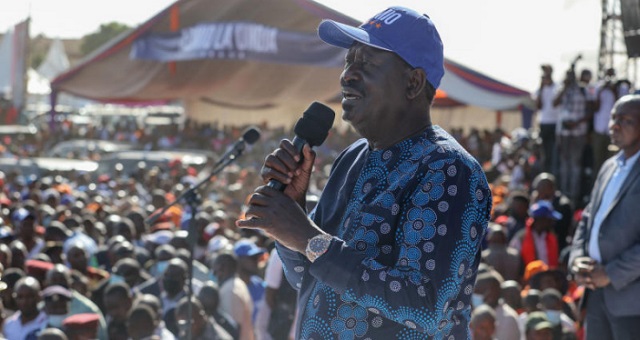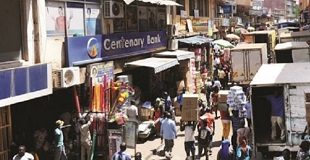
The political biography of one of the most compelling politicians in postcolonial Africa
THE LAST WORD | ANDREW M. MWENDA | I admire Raila Odinga. I think he is one of the most dynamic politicians in postcolonial Africa. So, I wished he would win the 2022 presidential elections in Kenya. At 78 years, this was his last chance to win the big prize, which has eluded him for 25 years. I feel sad he lost. In 2007/08, he was cheated. In 2017 and now in 2022, he came tantalizingly close. In all these cases he has managed this challenge with a remarkable degree of calmness and political maturity. I think if Kenya did not have a politician of Raila’s skill and circumspection, it would have faced more trouble.
Raila is a very ambitious politician. Yet he does not see power as a matter of life and death. I think this is because he has liberal values deeply rooted in his political DNA. He does not see the opposite side as enemies to destroy but opponents to defeat. That is why whenever he has lost, he has been willing to cross the isle even when everyone felt he should dig in and fight. In his political career, he has taken risks that allowed him to reach out to his opponents and make a deal. This required extraordinary courage.
In 1982, Raila was jailed by then President Daniel arap Moi for seven years. Released in 1988, he was rearrested in 1989. At some moments he was held in isolation for years and tortured. Released in 1989, he joined the prodemocracy movement in Kenya, risking his life, a factor that led him to run to exile. When he returned to Kenya, he went back to the political trenches, running against Moi in the 1997 elections. Yet in 2000, Raila shocked everyone with a dramatic political turnaround. He merged his political party with Moi’s KANU, joined government and was appointed a cabinet minister. Everyone accused him of selling out.
Raila was undeterred by such accusation because he believed in what he was doing. With Moi’s support, he was elected Secretary General of KANU and therefore became an insider. But when Moi selected Uhuru Kenyatta as his successor in the 2002 presidential elections, Raila disagreed. Kenyatta was a new comer to the political scene. So Raila led the revolt against Moi in KANU. Alongside such Kenyan-KANU political giants like former Vice President George Saitoti, Kalonzo Musyoka and Joseph Kamotho, they staged a massive walkout of KANU. It is this political earthquake that hit Moi causing a serious political realignment.
Yet the opposition in Kenya remained divided. The constitution at the time did not require an absolute majority of 50% plus one vote to win a presidential election. Consequently, Moi had always won because his opponents were divided, getting 36.7% of the votes in 1992 and 40% in 1997. When opposition leaders met to choose a joint candidate, they squabbled and failed. Sensing the mood of the nation, Raila came out of the meeting and raised Mwai Kibaki’s hand before an anxious throng and said they had selected the octogenarian golfer as their joint opposition candidate for 2002. It was a masterstroke that took Kibaki to the presidency that year.
Raila entered Kibaki’s cabinet but the two fell out over accusations of betrayal leading to his sacking from cabinet in 2005. This was after Kibaki lost a constitutional referendum Raila openly campaigned against. In the 2007 presidential elections Raila went head-to-head against Kibaki and, I think, won. After the violence over this disputed election, Raila accepted a negotiated settlement that made him prime minister under Kibaki. In 2012 and 2017, he ran against Kenyatta and William Ruto. In spite of the bigger competition, he kept channels of communication open with both.
The 2017 election again demonstrated Raila’s great amplitude of comprehension. After losing that election, he petitioned the Supreme Court to annul that election. I have a deep suspicion that Raila did this to appease his base, hoping the case would be thrown out. However, the court annulled the election. Raila, sensing the potential for violence that would result from such a re-run, pulled out leaving Kenyatta to win easily. I think it is this decision that led him to a handshake with Kenyatta.
I admit there may be many deviations, nuances and counter narratives to tale above. However, what I have stated above represents a fair degree of Raila’s political agility and skill. He has been willing to work with his opponents even when his base felt he had been cheated and should refuse to compromise. He has always had the courage to risk his reputation in pursuit of goals he believed in. This is what makes him a political giant, not just in Kenya or East Africa, but in the whole of Africa.
My period in journalism taught me that politicians seeking votes are always constrained in their decisions by fear to annoy their supporters. Many of these politicians may be open to negotiations and compromise. However, they fear that if they seek compromise, they will be seen as, and be accused of having been compromised by their opponents; especially if those opponents are in power. Cowardice and fear to stain their reputation is then presented as principle and courage. Raila’s willingness to risk his reputation in pursuit of the goals he held dear marks him out as a political Kirimanjaro in a big sea of political anthills.
Today Raila stands at another critical juncture. There is widespread belief among his admirers and supporters that he has been cheated. This is even the more compelling given the razor-thin vote difference between him and Ruto. He has thus rejected the results and promised to seek justice from the courts. Yet I believe Raila is doing this to appease his base, and perhaps he hopes the courts will reject his petition – which they should. I don’t think presidential election outcomes can be adjudicated by courts.
Courts are not, and cannot be, neutral arbiters of electoral contests, especially those with high stakes as the Kenyan one. The 2000 presidential election dispute between Al Gore and George Bush in America is a good example. Even if courts were neutral, it is hard to convince partisans of the losing side. People will invent reasons and “evidence” to claim political bias. Ultimately, court decisions cannot restrain power. They can only do so when the competing political forces are such that the “right” decision finds effective expression through actual demonstration of political power to enforce it – either through civic activism or military force.
****
amwenda@independent.co.ug
 The Independent Uganda: You get the Truth we Pay the Price
The Independent Uganda: You get the Truth we Pay the Price



There is Mr Mujuni at it again!
A very thinly veiled rebuke of Uganda’s opposition against the ruling junta which pays him.
He simply heaps praise on Kenyan politician Raila Odinga just because he’s always struck compromises with his various tormentors to work with them. Save for Daniel arap Moi’s regime,
political violence in Kenya is largely inter-ethnic, that’s, not state-inspired!
And two, what makes Raila to aspire for the top-most job in his land in spite of losing again and again is because he’s been facing different personalities at different times, who he doesn’t accuse of abusing state resources to stay in power. In short, no life-presidency in Kenya. Compare that with Kenya’s neighbour to the west, where the ruler worships his gun to keep him in power until biological clock ticks him out (power therefore is a matter of life and death!)
Further comment coming soon
1.Kenyans are always under pressure to behave as if they are so sophisticated may be they do this because they want to prove a point to Uganda unfortunately Ugandans have fallen for this lie i saw them speak too soon praising Kenyan’s electoral process now look what has happened?
2.Ralia is just unfortunate;he could end up taking mushroom soup for some time. I just fear for his health.
3.Kenya has had no coups that’s why her politics is not similar to that of Uganda, back home; we just cant take chances during elections we can not afford to act as if we are sophisticated thats why we deploy both civilized and primitive tactics for purposes of harmony and peace. We are a kind of society that could easily explode and the best the world would do for us is to broadcast our crisis on the international media.
4. Ugandans can now see the benefits of electing a former son of President and one from a wealthy family as President. they easily say enough and move on that’s why much as Uhuru Kenyatta had disagreed with Ruto he has accepted that his candidate lost .In short iam saying Muhoozi could do the same.
5.Uhuru Kenyatta should put on a brave face and done some behind the scenes additions so that Raila takes the lead after all the margin of win was too close and this is Africa.
6.Raila seem not to feel so hurt after this loss because he has been a VP and Prime Minister of Kenya .What does this mean he has tasted power and somehow he could have realized that its really not a big deal; When you sit in cabinet you see how the President stirs business in the meeting some how it occurs to you that perhaps the post of presidency is overrated.
7.The Luo are more contented with the praises, pamper and accolades that they receive from the first world dont be surprised that Ralia will accept defeat after the Diplomats from the first world counsel him.
8.Africa is on the rise; The emergence of the middle class ,globalization and industrialization has made parts of Africa to quickly move on after elections.
9.In comparison to Kenyan politics; Uganda will definitely be in a fix when it comes to handling over of power after the M7 era;we rather not think about it now because it requires a lot of mental exercise and exhaustion we are better off taking one day at a time.
Sorry to disappoint you but Kenyans do not act sophisticated to prove a point to a country that uses “primitive tactics” during elections and has had the same President since before over 80% of the citizens were born. The fact that you believe handing over power after the Museveni ERROR is mental exercise begets the universal notion that your country is full of academic dwarfs and lacks any leaders to take over except the current president’s son.
“Raila seem not to feel so hurt after this loss because he has been a VP and Prime Minister of Kenya,” – You are wrong on this. Mr Odinga has not been a Vice President. It is important to get your facts right.
@ Anonymous: My Bad; Anyway but there is almost no big difference between being a VP and Prime Minister but Odinga’s dad’s was a VP meaning that he has tasted that life of presidency.
My emphasis was that even if you have worked as personal assistants for CEOs,rich families and high profile Individuals at some point you not are not ordinary actually you are a security risk for them; because you know all their work schedules, you draft their speeches, you encourage them .when they appear in Public you don’t know how much panel beating we have carried out on them.